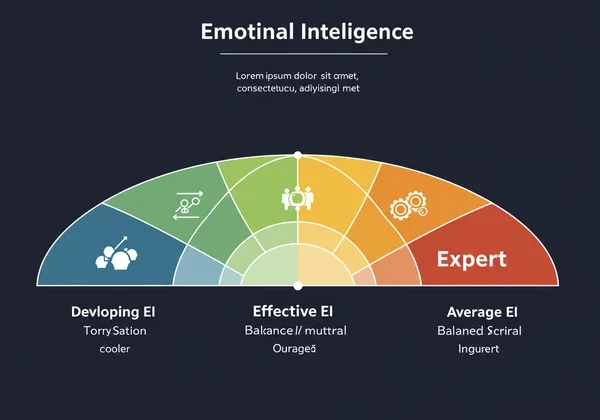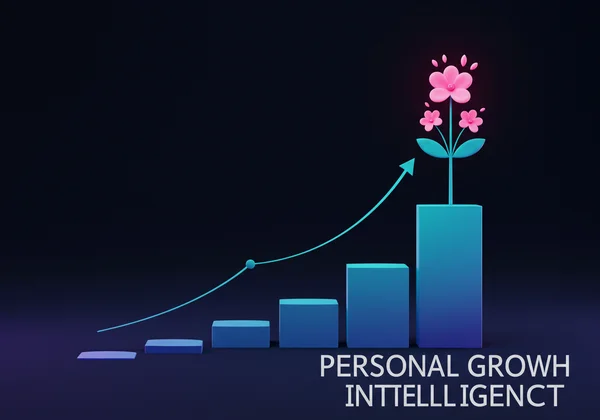एक अच्छा EI स्कोर क्या है? अपने EI टेस्ट के परिणामों को समझना
September 2, 2025 | By Evelyn Reed
आपने अभी-अभी एक भावनात्मक बुद्धिमत्ता (EI) परीक्षण दिया है, और अब आपके सामने एक संख्या है। यह अधिक आत्म-जागरूकता की दिशा में एक शानदार पहला कदम है! लेकिन तुरंत एक सामान्य प्रश्न उठता है: एक अच्छा EI स्कोर क्या है? इससे भी महत्वपूर्ण बात यह है कि वह संख्या आपके जीवन, आपके करियर और आपके रिश्तों के लिए वास्तव में क्या मायने रखती है? यदि आप सोच रहे हैं, मुझे कैसे पता चलेगा कि मेरा EQ उच्च है?, तो आप सही जगह पर हैं।
यह मार्गदर्शिका आपको यह समझने में मदद करेगी कि आपकी भावनात्मक बुद्धिमत्ता का स्कोर वास्तव में क्या मायने रखता है, उस संख्या को व्यक्तिगत विकास के लिए एक शक्तिशाली रोडमैप में बदल देगा। एक EI स्कोर अंतिम ग्रेड नहीं है; यह आत्म-खोज की एक रोमांचक यात्रा का शुरुआती बिंदु है। यदि आपने अभी तक अपना स्कोर नहीं जाना है, तो आप अपना व्यक्तिगत आधारभूत स्कोर प्राप्त करने के लिए हमारा निःशुल्क EI परीक्षण दे सकते हैं।

अपने EI टेस्ट स्कोर को समझना: संख्या से परे
इससे पहले कि हम यह परिभाषित कर सकें कि "अच्छा" स्कोर क्या है, यह समझना आवश्यक है कि आपके EI टेस्ट स्कोर वास्तव में क्या मापते हैं। पारंपरिक IQ परीक्षण के विपरीत जो संज्ञानात्मक क्षमताओं का आकलन करता है, एक EI परीक्षण स्वयं में और दूसरों में भावनाओं को समझने, उपयोग करने, समझने और प्रबंधित करने की आपकी क्षमता का मूल्यांकन करता है। इसे एक ग्रेड के रूप में कम और आपके वर्तमान भावनात्मक कौशल का एक संक्षिप्त चित्रण के रूप में अधिक समझें।
EI मूल्यांकन कैसे काम करते हैं: एक संक्षिप्त अवलोकन
वैज्ञानिक आधार वाले EI मूल्यांकन, जैसे कि हमारे प्लेटफॉर्म पर पाए जाते हैं, स्थापित मनोवैज्ञानिक ढाँचों जैसे कि ट्रेट इमोशनल इंटेलिजेंस प्रश्नावली (TEIQue) या MSCEIT के सिद्धांतों पर आधारित हैं। ये मूल्यांकन आपको विभिन्न भावनात्मक स्थितियों में आपकी सामान्य प्रतिक्रियाओं के बारे में प्रश्नों की एक श्रृंखला प्रस्तुत करते हैं। आपके उत्तर आत्म-जागरूकता, आत्म-नियमन, सामाजिक जागरूकता और संबंध प्रबंधन सहित कई मुख्य दक्षताओं में एक प्रोफ़ाइल तैयार करते हैं। अंतिम स्कोर इन भावनात्मक शक्तियों और विकास के क्षेत्रों का एक समग्र प्रतिबिंब है। यह संरचित दृष्टिकोण सुनिश्चित करता है कि आपको एक प्रतिष्ठित ऑनलाइन EI परीक्षण से एक सार्थक मूल्यांकन प्राप्त हो।
भावनात्मक बुद्धिमत्ता स्कोर का स्पेक्ट्रम
अधिकांश EI परीक्षण स्कोर को एक साधारण पास/फेल के बजाय एक स्पेक्ट्रम में वर्गीकृत करते हैं। जबकि विभिन्न मॉडलों के बीच सटीक संख्याएँ भिन्न होती हैं, वे आम तौर पर तीन व्यापक श्रेणियों में आती हैं:
-
विकासशील EI (निचली श्रेणी): इस श्रेणी में एक स्कोर यह सुझाव दे सकता है कि आपको कभी-कभी अपनी भावनाओं को पहचानने या दूसरों की भावनाओं को समझने में कठिनाई होती है। आप तनावपूर्ण स्थितियों में आवेगपूर्ण प्रतिक्रिया दे सकते हैं या सामाजिक जटिलताओं से निपटना चुनौतीपूर्ण लग सकता है। यह कोई कमजोरी नहीं है, बल्कि विकास का एक अविश्वसनीय अवसर है।
-
प्रभावी EI (औसत श्रेणी): अधिकांश लोग इस श्रेणी में आते हैं। यह भावनात्मक बुद्धिमत्ता में एक ठोस नींव को इंगित करता है। आप आम तौर पर अपनी भावनाओं को प्रबंधित कर सकते हैं, सामाजिक संकेतों को समझ सकते हैं और स्वस्थ संबंध बनाए रख सकते हैं, लेकिन कुछ विशिष्ट क्षेत्र हैं जहाँ आप बेहतर परिणामों के लिए अपने कौशल को बढ़ा सकते हैं।
-
विशेषज्ञ EI (उच्च श्रेणी): एक उच्च स्कोर आपके स्वयं के भावनात्मक परिदृश्य की गहरी समझ और दूसरों के प्रति सहानुभूति रखने की एक मजबूत क्षमता को दर्शाता है। आप संचार, संघर्ष समाधान और दूसरों को प्रेरित करने में उत्कृष्टता प्राप्त करते हैं। आप सामाजिक स्थितियों को आसानी से नेविगेट करते हैं और चुनौतियों का सामना करने में लचीले होते हैं।

एक अच्छा EI स्कोर क्या है? सफलता के लिए मानदंड
तो, आइए मुख्य प्रश्न पर लौटते हैं। एक "अच्छा" EI स्कोर वह है जो आपकी वर्तमान क्षमताओं को सटीक रूप से दर्शाता है और आपको बढ़ने के लिए सशक्त बनाता है। एक आदर्श संख्या का पीछा करने के बजाय, लक्ष्य यह समझना है कि आपका स्कोर आपको अपने बारे में क्या बताता है। सबसे सफल लोगों के पास केवल एक उच्च स्कोर नहीं होता है; वे सुधार के लिए अपने EI परीक्षण परिणामों से प्राप्त अंतर्दृष्टि का सक्रिय रूप से उपयोग करते हैं।
अपने व्यक्तिगत EI स्कोर परिणामों की व्याख्या करना
आपका व्यक्तिगत स्कोर डेटा का एक अंश है, न कि कोई निर्णय। जब आप अपने परिणामों को देखें, तो स्वयं से ये प्रश्न पूछें:
- मेरी ताकतें क्या हैं? क्या आपका स्कोर सहानुभूति या आत्म-जागरूकता के लिए उच्च क्षमता दर्शाता है? इन क्षेत्रों को पहचानें और उनका लाभ उठाएं।
- विकास के मेरे अवसर क्या हैं? शायद आपका स्कोर बताता है कि आत्म-नियमन या संबंध प्रबंधन में सुधार किया जा सकता है। यह लक्षित व्यक्तिगत विकास के लिए मूल्यवान जानकारी है।
- ये स्कोर मेरे दैनिक जीवन में कैसे प्रकट होते हैं? अमूर्त संख्याओं को काम पर, परिवार के साथ, या सामाजिक परिवेश में वास्तविक दुनिया के अनुभवों से जोड़ें।
आपको मिलने वाला प्रारंभिक स्कोर सिर्फ शुरुआत है। हमारे प्लेटफॉर्म पर, हम एक वैकल्पिक, AI-संचालित गहन विश्लेषण रिपोर्ट प्रदान करते हैं जो आपके स्कोर को व्यक्तिगत, कार्रवाई योग्य अंतर्दृष्टि में बदल देती है, जिससे आपको आगे बढ़ने के लिए एक स्पष्ट मार्ग बनाने में मदद मिलती है। आप अपना EI स्कोर जांच सकते हैं और देख सकते हैं कि यह क्या बताता है।
उच्च भावनात्मक बुद्धिमत्ता के संकेत: क्या आपका EQ उच्च है?
एक उच्च भावनात्मक बुद्धिमत्ता स्कोर अक्सर अवलोकन योग्य, सकारात्मक व्यवहारों को दर्शाता है। यदि आप सोच रहे हैं कि उच्च EQ व्यवहार में कैसा दिखता है, तो यहाँ कुछ सामान्य संकेत दिए गए हैं:
-
आप आत्म-जागरूक हैं: आप अपनी भावनाओं को समझते हैं और वे आपके विचारों और व्यवहार को कैसे प्रभावित करती हैं। आप अपनी ताकत और कमजोरियों को जानते हैं।
-
आप आत्म-नियमन का अभ्यास करते हैं: आप अपनी भावनाओं को खुद पर हावी नहीं होने देते। आप आवेगपूर्ण भावनाओं और व्यवहारों को प्रबंधित कर सकते हैं, दबाव में शांत रह सकते हैं और कार्य करने से पहले सोचते हैं।
-
आप सहानुभूति रखते हैं: आप अन्य लोगों की भावनाओं, आवश्यकताओं और चिंताओं को समझ सकते हैं। आप एक समूह में सामाजिक संकेतों और समूह की गतिशीलता को पहचानने में अच्छे हैं।
-
आपके पास मजबूत सामाजिक कौशल हैं: आप जानते हैं कि अच्छे संबंध कैसे विकसित और बनाए रखें, स्पष्ट रूप से संवाद करें, दूसरों को प्रेरित और प्रभावित करें, और संघर्ष का प्रबंधन करें।
-
आप प्रेरित हैं: आप अपने लक्ष्यों को प्राप्त करने के लिए प्रेरित हैं, पहल दिखाते हैं, और बाधाओं का सामना करने पर भी आशावादी रहते हैं।

अपने EI टेस्ट परिणामों को कार्रवाई और विकास में बदलना
एक EI परीक्षण का वास्तविक मूल्य केवल स्कोर नहीं है; यह वह है जो आप उस अंतर्दृष्टि के साथ करना चुनते हैं। IQ के विपरीत, भावनात्मक बुद्धिमत्ता स्थिर नहीं है। यह कौशल का एक ऐसा समूह है जिसे अभ्यास से प्राप्त और सुधारा जा सकता है। आपका EI स्कोर इस परिवर्तनकारी यात्रा के लिए एकदम सही शुरुआती बिंदु है।
व्यक्तिगत विकास के लिए अपने स्कोर का लाभ उठाना
एक बार जब आप अपनी EI प्रोफ़ाइल को समझ जाते हैं, तो आप लक्षित आत्म-सुधार शुरू कर सकते हैं। उदाहरण के लिए, यदि आपकी रिपोर्ट आत्म-नियमन में एक अवसर को उजागर करती है, तो आप माइंडफुलनेस तकनीकों का अभ्यास कर सकते हैं, प्रतिक्रिया देने से पहले रुकने के लिए रणनीतियाँ विकसित कर सकते हैं, या अपने भावनात्मक ट्रिगर्स की पहचान करना सीख सकते हैं। यदि सामाजिक जागरूकता विकास का एक क्षेत्र है, तो आप सक्रिय श्रवण का अभ्यास कर सकते हैं या दूसरों के दृष्टिकोण से स्थितियों को देखने का सचेत प्रयास कर सकते हैं। आपके निःशुल्क ऑनलाइन परीक्षण से मिली हर अंतर्दृष्टि आपकी व्यक्तिगत विकास योजना का एक कदम बन सकती है।
आपका EI स्कोर एक गतिशील आधारभूत रेखा के रूप में, एक निश्चित लेबल नहीं
अपने EI स्कोर को एक गतिशील आधारभूत रेखा के रूप में देखना महत्वपूर्ण है - यह इस बात का माप है कि आप अभी कहाँ हैं। यह एक स्थायी लेबल नहीं है जो आपको हमेशा के लिए परिभाषित करता है। जैसे-जैसे आप अपने भावनात्मक कौशल विकसित करेंगे, आपकी क्षमता बढ़ेगी। अपनी प्रगति को ट्रैक करने और ध्यान केंद्रित करने के लिए नए क्षेत्रों की पहचान करने के लिए समय-समय पर, शायद हर छह से बारह महीने में, एक EI परीक्षण लेने पर विचार करें। मूल्यांकन और विकास की यह प्रक्रिया आपके व्यक्तिगत और व्यावसायिक जीवन दोनों में आपकी पूरी क्षमता को अनलॉक करने की कुंजी है।

उच्च भावनात्मक बुद्धिमत्ता की आपकी यात्रा अब शुरू होती है
अधिक आत्म-जागरूकता को अनलॉक करें, मजबूत संबंध बनाएं, और अधिक सफलता प्राप्त करें - यह सब आपकी भावनात्मक बुद्धिमत्ता के स्कोर को समझने से शुरू होता है। एक "अच्छा" स्कोर कोई भी ऐसा स्कोर है जिसका उपयोग आप प्रतिबिंब के लिए एक उपकरण के रूप में और सकारात्मक बदलाव के लिए एक उत्प्रेरक के रूप में कर सकते हैं। यह आपकी जन्मजात क्षमता को मूर्त कौशल में बदलने के लिए आवश्यक अंतर्दृष्टि प्रदान करता है।
क्या आप अपनी भावनात्मक शक्तियों को जानने और अपनी व्यक्तिगत विकास यात्रा शुरू करने के लिए तैयार हैं? अपनी भावनाओं को जानने का मार्ग स्पष्ट है। आज ही अपनी यात्रा शुरू करें और उन अंतर्दृष्टि को अनलॉक करें जो आपको जीवन भर सशक्त बनाएंगी।
EI स्कोर के बारे में अक्सर पूछे जाने वाले प्रश्न
EI परीक्षण क्या है?
एक EI परीक्षण, या भावनात्मक बुद्धिमत्ता परीक्षण, एक मनोवैज्ञानिक मूल्यांकन उपकरण है जिसे आपकी भावनात्मक बुद्धिमत्ता के विभिन्न पहलुओं को मापने के लिए डिज़ाइन किया गया है। यह आपकी अपनी भावनाओं को पहचानने, समझने और प्रबंधित करने की क्षमता, साथ ही दूसरों की भावनाओं को पहचानने और प्रभावित करने की क्षमता का मूल्यांकन करता है। यह व्यक्तिगत और व्यावसायिक विकास के लिए मूल्यवान अंतर्दृष्टि प्रदान करता है।
EI स्कोर की गणना कैसे की जाती है?
एक EI स्कोर स्थितियों और आत्म-चिंतनशील प्रश्नों की एक श्रृंखला के प्रति आपकी प्रतिक्रियाओं के आधार पर गणना की जाती है। सिस्टम आपके उत्तरों का विश्लेषण करता है ताकि आत्म-जागरूकता और संबंध प्रबंधन जैसी मुख्य EI दक्षताओं से संबंधित पैटर्न की पहचान की जा सके। अंतिम स्कोर इन प्रमुख क्षेत्रों में आपकी क्षमताओं का एक समग्र प्रतिनिधित्व है।
क्या मैं अपनी भावनात्मक बुद्धिमत्ता के स्कोर में सुधार कर सकता हूँ?
बिल्कुल! भावनात्मक बुद्धिमत्ता को व्यापक रूप से एक लचीला कौशल माना जाता है, न कि एक निश्चित विशेषता। नए भावनात्मक कौशल - जैसे कि माइंडफुलनेस, सक्रिय श्रवण और सहानुभूति - का सचेत रूप से अभ्यास करके, आप समय के साथ अपने EI में महत्वपूर्ण सुधार कर सकते हैं। आपका प्रारंभिक स्कोर इस विकास के लिए सिर्फ एक शुरुआती बिंदु है।
क्या उच्च EQ वाले लोग अधिक सफल होते हैं?
जबकि सफलता बहुआयामी है, व्यापक शोध उच्च भावनात्मक बुद्धिमत्ता (EQ) और जीवन के कई क्षेत्रों में सफलता के बीच एक मजबूत संबंध दर्शाता है। उच्च EQ वाले लोग अक्सर नेतृत्व की भूमिकाओं में उत्कृष्टता प्राप्त करते हैं, मजबूत संबंध बनाते हैं, तनाव को अधिक प्रभावी ढंग से प्रबंधित करते हैं, और अधिक कौशल के साथ कार्यस्थल की परिस्थितियों को बेहतर ढंग से संभालते हैं, ये सभी करियर और व्यक्तिगत सफलता में योगदान करते हैं।
मेरे EI स्कोर को जानने के क्या लाभ हैं?
EI मूल्यांकन से अपना EI स्कोर जानना आत्म-जागरूकता के लिए एक स्पष्ट आधार रेखा प्रदान करता है। यह आपको अपनी भावनात्मक शक्तियों की पहचान करने, सुधार के लिए विशिष्ट क्षेत्रों को इंगित करने, अपने संबंधों को बेहतर बनाने, दबाव में बेहतर निर्णय लेने, और अंततः अधिक व्यक्तिगत और व्यावसायिक क्षमता को अनलॉक करने में मदद करता है।